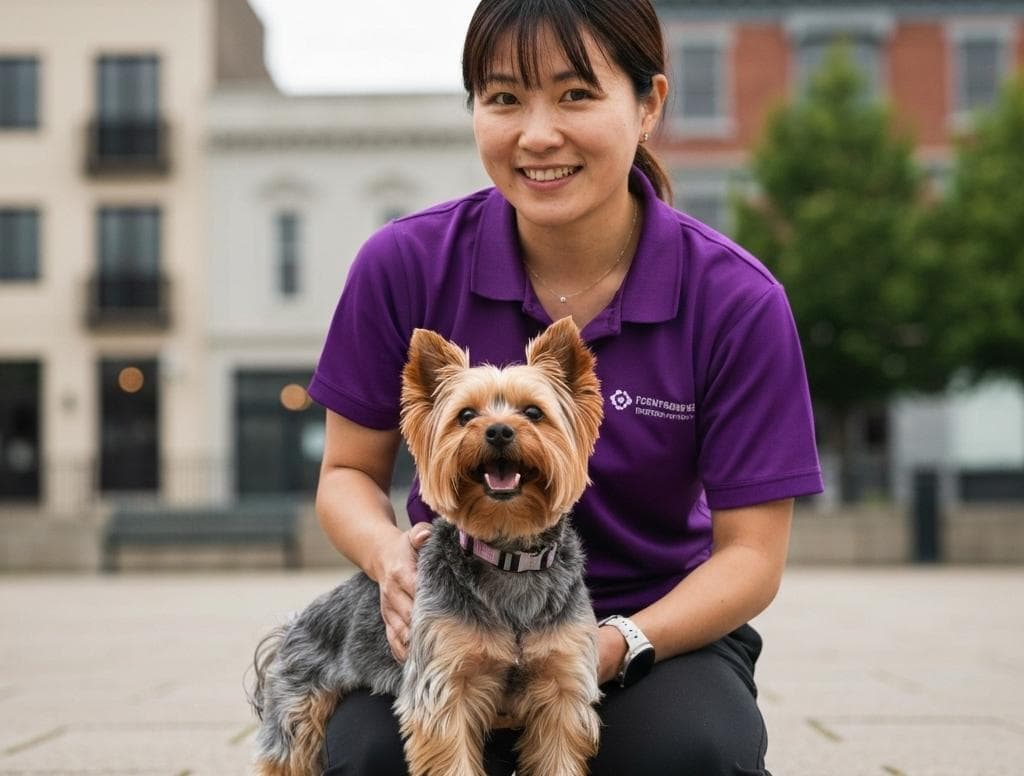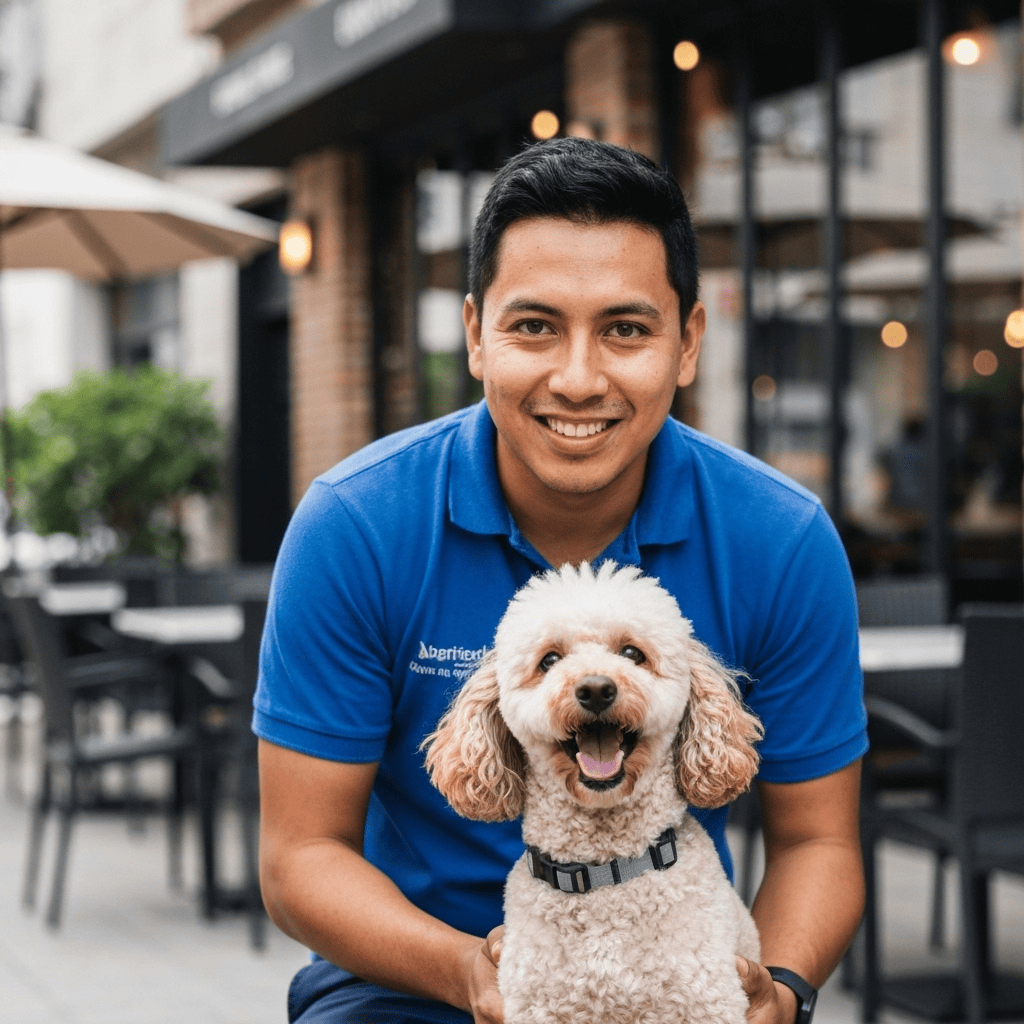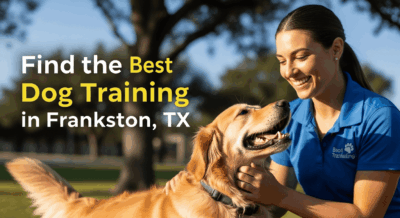Your Complete Guide to Choosing a Dog Trainer in Frankston
When you’re raising a dog in a small East Texas town like Frankston, training looks a little different than it would in Dallas or Houston. Your pup needs to handle the quiet streets around Lake Palestine just as well as the weekend crowds at the boat ramps. They should walk nicely past fishing spots, stay calm when campers set up nearby, and come when called even with all those interesting lake smells in the air.
Finding the right trainer here means looking for someone who gets small-town life. You want a professional who can work with your schedule and understands that sometimes the best training happens in your backyard or down by the water. Most trainers in Anderson County will travel to you, which makes sense when you’re dealing with the distances between towns out here.
How to Choose the Right Trainer
The best trainers use positive reinforcement methods that make learning fun for your dog. This approach works especially well when you’re practicing around distractions like kids playing at the park or other dogs at the lake. Your dog should look forward to training sessions, not worry about what might happen if they make a mistake.
Look for trainers with real credentials. The good ones usually have certifications like CPDT-KA, KPA-CTP, or CBCC-KA. If you want to understand what these letters actually mean, check out this guide to dog trainer certifications.
Since many families around here prefer in-home training, make sure your trainer is willing to come to you. Ask about their travel area and whether they charge extra to reach places like Coffee City or the far side of Lake Palestine.
Training Methods That Actually Work

The trainers worth hiring around East Texas use methods that build your dog’s confidence while teaching real-world skills. Here’s what you should expect to see.
Basic obedience training covers the essentials: sit, stay, come, down, and loose-leash walking. These skills matter when you’re strolling through town or need your dog to settle while you chat with neighbors. Puppy training focuses on house training, crate comfort, and helping your young dog meet new people and situations without getting overwhelmed.
When dogs have bigger challenges like fear or aggression, good trainers use behavior modification techniques. These approaches help your dog feel more comfortable around whatever worries them, whether that’s strangers, other dogs, or loud noises from boats and ATVs.
Some trainers offer day training, where they work with your dog during the day and then teach you how to practice at home. Board and train programs can work too, but make sure the trainer spends plenty of time showing you how to maintain what your dog learned while they were away.
What Training Costs Around Frankston
Prices in Anderson County tend to be more reasonable than what you’d pay in big cities, though you might pay a little extra for travel to rural areas. Here’s what you can expect.
| Service Type | Typical Price Range | What to Know |
|---|---|---|
| Group classes (4-6 weeks) | $120 – $250 total | Often held in Tyler or Palestine |
| Private lessons (60-90 minutes) | $75 – $140 per session | May include travel fee for rural areas |
| Puppy packages (4-6 sessions) | $300 – $550 total | Usually covers house training and socialization |
| Day training (weekly) | $350 – $750 per week | Trainer works your dog, teaches you |
| Board and train (2-3 weeks) | $1,400 – $3,000 total | Ask lots of questions about their facility |
| Behavior consultation | $100 – $200 initial | Complex cases need follow-up sessions |
Always ask for a written estimate that spells out exactly what you’re getting. Good trainers are upfront about their fees and what happens if you need to reschedule.
Questions Every Dog Owner Should Ask
Before you hire anyone, have a real conversation about their approach and experience. Here are the important questions:
- What training methods do you use, and how do you handle dogs who get scared or stressed?
- What certifications do you have, and when did you earn them?
- How will you customize a program for my dog’s specific issues and my family’s lifestyle?
- Do you offer private lessons, group classes, or day training, and which would work best for us?
- How do you help with leash pulling, barking, or separation anxiety?
- What’s included in your package price, and are there any extra fees for travel to Frankston?
- Do you carry liability insurance?
- Will you work with my vet if we need to discuss medication or health issues?
- Can we meet for a consultation before I commit to a full program?
Pay attention to how they answer. Good trainers take time to understand your situation instead of pushing you toward their most expensive package.
Local Rules You Need to Know
Frankston keeps things simple, but there are still some basics to follow when you’re out and about with your dog.
Keep your dog on a leash in public areas and don’t let them roam loose around town or the lake. Texas requires current rabies vaccination for all dogs, and you can find the official requirements at Texas DSHS.
Be considerate about barking, especially if you’re staying at one of the RV parks or camping areas around Lake Palestine. Anderson County doesn’t require dog licenses, but you can check for any updates at Anderson County's website.
If your trainer wants to use public spaces for lessons, they should check with property owners first. Texas doesn’t require special licenses for dog trainers, but the good ones carry business insurance to protect their clients.
Great Places to Practice Around Here
Start training in quiet spots, then gradually work up to busier areas as your dog improves.
Early morning walks through the residential areas near the lake give you peaceful space to work on loose-leash walking and polite greetings with neighbors. School parking lots work great for recall practice when classes aren’t in session.
Tyler State Park offers excellent trails for practicing around bikes, families, and wildlife. Purtis Creek State Park tends to be quieter and works well for dogs who get overwhelmed easily.
If you want to practice around water and wildlife, Neches River National Wildlife Refuge has nice trails where your dog can learn to focus on you despite interesting smells and sounds. Just remember that all these places require leashes, which you can confirm at Texas State Parks pet policies.
Local Resources Worth Knowing About
- Anderson County – Official county information and contacts
- Tyler State Park – Dog-friendly trails and picnic areas
- Purtis Creek State Park – Quieter trails perfect for nervous dogs
- Neches River National Wildlife Refuge – Nature trails with wildlife viewing
- Texas DSHS Rabies Information – Vaccination requirements and guidance
- Texas State Parks Pet Policies – Rules for all state parks
What to Expect from Professional Trainers
Good trainers carry liability insurance even though Texas doesn’t require it. If someone offers board and train services, ask detailed questions about their facility, daily routine, and emergency procedures. You want to know your dog will be safe and well-cared for.
The best trainers also stay in touch with local veterinarians and can refer you to other professionals if your dog needs medical attention or specialized help they can’t provide.

Common Questions About Dog Training
How much does in-home dog training cost in Frankston?
Most trainers charge $75-$140 per private session, with possible travel fees of $10-$25 for areas outside town limits.
Is in-home training better than group classes?
In-home training works especially well for house training, behavior problems, and dogs who get overwhelmed in group settings. You also get personalized attention and can practice in the places where you actually need good behavior.
Can a trainer help with potty training?
Yes, many trainers offer puppy packages that include house training plans and ongoing support. You’ll still need to stick to the schedule between sessions, but having professional guidance makes the process much smoother.
How long does dog training take?
Most dogs start showing improvement within 2-4 sessions if you practice daily. Behavior issues like reactivity or aggression usually need several months of consistent work.
What should I bring to a training session?
Have a regular collar or harness, a 6-foot leash, small high-value treats, water, and vaccination records if requested. Skip the retractable leash during training sessions.
What are the leash laws in Frankston?
Keep your dog leashed and under control in public areas. Dogs shouldn’t be allowed to run loose around town. Check with city hall or Anderson County for any updates.
Do I need a dog license in Anderson County?
Texas doesn’t have a statewide licensing requirement, and Anderson County doesn’t issue dog licenses. Just keep your dog’s rabies vaccination current and make sure they wear a collar with tags.
What vaccinations does my dog need in Texas?
Rabies vaccination is required by state law. Your vet might recommend additional vaccines like DHPP and Bordetella based on your dog’s lifestyle. Check the official requirements at Texas DSHS.
Do dog trainers need licenses in Texas?
No special license is required, but many professional trainers pursue voluntary certifications like CPDT-KA or CPDT-KSA to demonstrate their knowledge and commitment to ongoing education.
Where can I practice off-leash recall?
Use your own fenced yard or a long training line in open areas. State parks require leashes, but you can practice recall on a long line there. Some cities near Frankston have designated off-leash dog parks.
Can I train my dog at local parks?
Most public parks welcome well-behaved dogs on leash. Keep training sessions low-key and respectful of other visitors. If you’re working with a professional trainer, they should get permission before using public spaces for lessons.
Are there dog-friendly trails near Frankston?
Tyler State Park and Purtis Creek State Park both welcome leashed dogs on their trails. Always check current pet policies at Texas State Parks before you visit.
Training your dog in Frankston means preparing them for the unique rhythm of small-town East Texas life. The right professional trainer will help you build skills that work whether you’re walking quiet streets or navigating busy weekend lake activities. Take your time choosing someone who uses positive methods and understands what life is really like out here. With consistent practice and good guidance, your dog can become the well-behaved companion you’ve always wanted.
